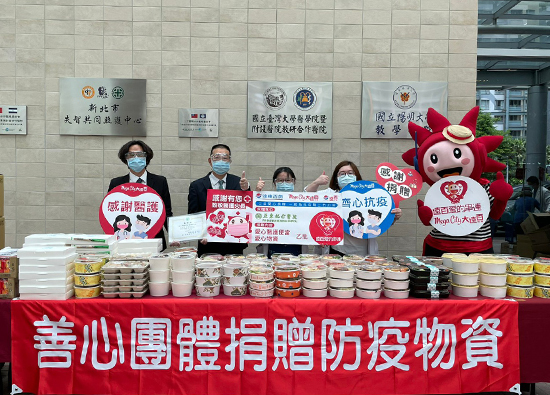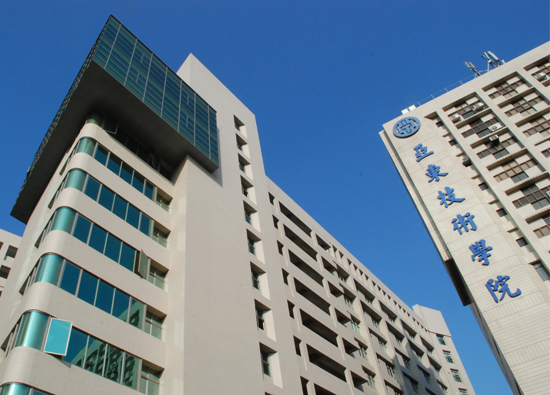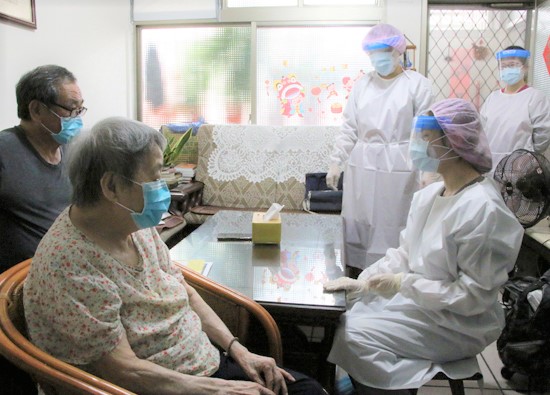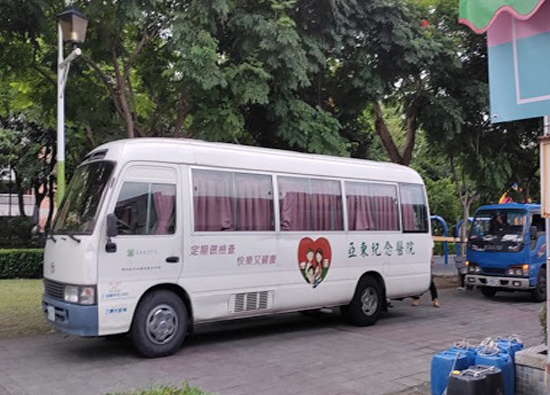08.2021 Group Briefing
U-Ming Marine 2021 Shareholders’ Meeting
U-Ming Marine /
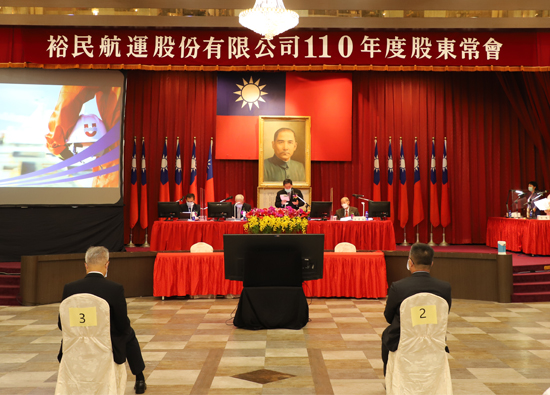
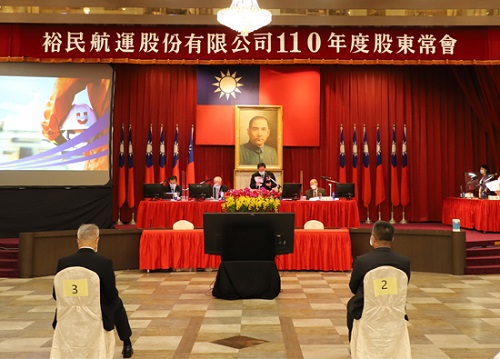 U-Ming Marine Transport Corporation held its 2021 Annual Shareholder’s Meeting (AGM) at 9:00 a.m. today (July 13) at the Taipei Hero House. The meeting was hosted by Chairman Mr. Douglas Hsu who has successfully presented the financial statements and the earnings distribution for 2020. In 2020, the annual consolidated revenue was NT$8.507 billion with earnings after tax of NT$878 million and earnings per share (EPS) of NT$1.04. The meeting has also passed a motion of cash payment dividend of NT$1.20 per share, maintaining the company’s record of high surplus payouts and high dividend yields. U-Ming continued to demonstrate its sound financial structure with a total of NT$11.213 million in undistributed earnings and statutory reserves available for distribution. It has NT$13.2 billion cash on hand to support the future expansion and dividend payments. The company will continue its efforts to reward shareholders with a strong performance.
U-Ming Marine Transport Corporation held its 2021 Annual Shareholder’s Meeting (AGM) at 9:00 a.m. today (July 13) at the Taipei Hero House. The meeting was hosted by Chairman Mr. Douglas Hsu who has successfully presented the financial statements and the earnings distribution for 2020. In 2020, the annual consolidated revenue was NT$8.507 billion with earnings after tax of NT$878 million and earnings per share (EPS) of NT$1.04. The meeting has also passed a motion of cash payment dividend of NT$1.20 per share, maintaining the company’s record of high surplus payouts and high dividend yields. U-Ming continued to demonstrate its sound financial structure with a total of NT$11.213 million in undistributed earnings and statutory reserves available for distribution. It has NT$13.2 billion cash on hand to support the future expansion and dividend payments. The company will continue its efforts to reward shareholders with a strong performance.
U-Ming analyzes that the bulk transportation market will benefit from the recovery of the global economy following the impact of the COVID-19 pandemic in 2019 and the accelerated investment in infrastructure by many countries which will stimulate the demand for bulk material. This, coupled with the increasingly stringent IMO regulations on carbon emissions from ships helps accelerate the phasing out of older vessels and is expected to lead to limited growth in new ship deliveries and hence a more optimistic growth in bulk shipping prices in 2021. In addition, U-Ming has been signing long-term contracts with stable charter rates in recent years which are expected to generate a consistent cash flow. Therefore, U-Ming's shareholders' meeting resolved that, in addition to issuing all of the annual surplus of 2020, U-Ming will also set aside the retained earnings from previous years to return to shareholders in order to improve shareholders' return on investment.
In 2020, the global COVID-19 pandemic has affected the demand within the shipping market. The Baltic Dry Index (BDI) collapsed to a new low of 393 points in May and demand for steel, coal and other raw materials fell sharply as the global economy came to a near halt. However, since the second half of 2020, the market has been gradually recovering due to the gradual implementation of various pandemic prevention measures and the rebound in industrial and consumer demand. The shipping market continues to regain momentum benefiting from the peak season for grain exports from North America and the start of governments efforts to revive their economies and expand domestic demand. The Baltic Dry Index (BDI) sharply rose by 2.28 times in the first half of this year compared to the same period last year.
Moreover, in order to revive from the impact of pandemic, countries around the world have launched policies such as infrastructure building expansion to stimulate the economy. For example, the US Biden administration has launched a 10-year US$2 trillion plan for comprehensive infrastructure, plus the previous US$1.9 trillion for the rescue plan, the total is nearly US$4 trillion. Along with the popularity of vaccination and the ease of the pandemic, it is expected that the economy of the countries all over world will accelerate its recovery in the future and the growth of demand will explode as a result of lifting lockdowns.
The International Monetary Fund (IMF) predicts that global GDP growth will be around 6% this year, with the US and China leading the way in terms of demand. The growth rate of China's GDP is expected to be 8.4% this year. China accounts for more than 50% of global bulk demand. The economic recovery in China and the rebound in real estate demand will drive demand for raw materials, which will be the main driving force behind the upward trend in the bulk shipping market this year. Meanwhile China's steel demand which accounts for more than half of the global demand will also gradually become more stable. Australia and Brazil remain the main exporters of iron ore with Brazil experiencing a faster resumption of production and Vale expects iron ore production to peak in the second half of the year with capacity increasing by 9% to 350 million tons. The BDI index is expected to rise continuously thanks to the growing demand for coal, grains and steel.
In terms of market supply, ship deadweight tonnage had increased by 3.8% in 2020. However, with the implementation of international environmental regulations, such as the emission limitation conventions for carbon dioxide emissions, sulfide emissions and nitride emissions, older vessels are being forced out of service. The market is expected to see a decline in capacity. The current berth of global shipyards will be building mostly container vessels until 2023, thus the growth in the supply market of bulk carriers will be low in the next 2 to 3 years. U-Ming takes the advantage of this historic low moment to enter the market and has continued to place orders for building new ships since early 2020. A total of 14 ships have been signed, including Capesize ships comply with IMO NOx Tier III and LNG dual fuel, all of which are state-of-the-art technology, latest design and most energy-efficient ships. This is conducive to the future of the increasing bulk carriers market and to achieve exceptional business performance again.
In 2016, U-Ming entered the fifth year of its global fleet safety management system (FSM) in partnership with Ericsson. With the establishment of the new Operation Center in 2020, the company is able to monitor the key performance indicators of each of its vessels in near real-time. This has not only improved operational transparency, but has also resulted in an average fuel saving of at least 2% per voyage, resulting in cost savings of several million dollars. In the spirit of sustainable management, U-Ming has utilized digital technology to achieve a more environmentally friendly and safer maritime operating model and is utilizing resources efficiently to minimize the impact on the marine ecosystem. The integration of these systems will help us to improve operational efficiency and ensure safe ship operations.
Dry bulk is a cyclical industry. U-Ming understands that only a prudent business strategy and a sound financial structure can minimize the impact of the market volatility. In 2018, U-Ming signed a 25-year long-term iron ore Contract of Affreightment which commenced in September 2020, for two sets of 325,000mt VLOC (Very Large Ore Carrier) with Vale International SA, one of the world's largest iron ore producers. In addition, U-Ming signed a 10-year Time Charter contract in 2020 with Anglo American PLC for four LNG dual-fuelled bulk carriers with deliveries between 2022 and 2023. With the advantage of the flexible deployment of spot ships and long term contracts, U-Ming will be able to generate stable long-term profits and thus reward its shareholders.
U-Ming Shipping’s long-standing commitment to sustainable management has been recognized both domestically and internationally. In 2020, U-Ming was awarded the Gold Award in the Taiwan Corporate Sustainability Awards for the transportation industry by the Taiwan Sustainable Energy Research Foundation. Concurrently, for four consecutive years, U-Ming was included in the FTSE4Good Emerging Markets Index and the FTSE4Good TIP Taiwan ESG Index, both of which are rated by FTSE Russell and the Taiwan Stock Exchange. U-Ming was also awarded four awards by the Ministry of Transportation and Communications (MOTC) in the 2019 Annual Outstanding Shipping Transportation Industry Awards, namely "Outstanding Development in Port Operations", "Outstanding Fleet Expansion", "Outstanding Development in Green Shipping" and "Outstanding Support for Industry-Academia Cooperation in Maritime Training". To promote friendly workplace, U-Ming was awarded Badge of Accredited Healthy Workplace by Health Promotion Administration and won the HR “Asia Best Companies to Work for in Asia 2021”. U-Ming also is the winner of World Finance Corporate Governance Awards –Taiwan- 2021. In March 2021, together with E.Sun Bank, a Sustainability Index-Linked Loan Facility was set up, marking a new milestone for domestic banks. All of this demonstrates U-Ming's excellence in environmental protection, corporate social responsibility and corporate governance (ESG).
U-Ming Shipping currently owns a fleet of Capesize, Panamax, Post Panamax, Supramax, Ultramax, cement tankers, VLCCs and VLOCs. The average age of the bulk carrier fleet is about 6 years, plus joint ventures, escrow vessels and personnel carriers related to the wind power industry. U-Ming's fleet has reached 62 vessels with a total deadweight tonnage of 8,394,000 tons and has overseas subsidiaries in Singapore, Hong Kong and Xiamen currently.
#



